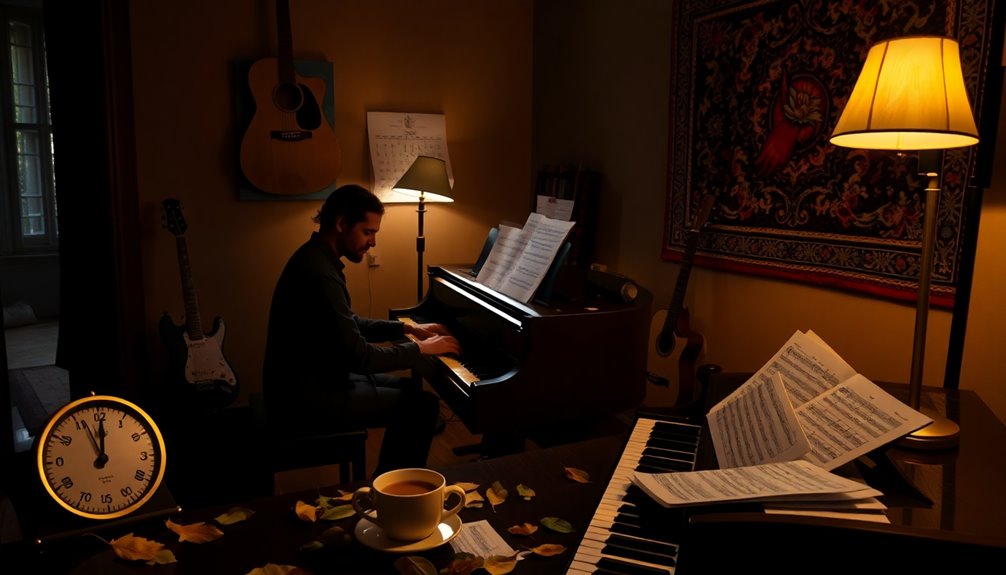Juggling music and life requires a strategic approach. First, establish a consistent practice routine that fits your schedule, even if it's short and intentional. Set realistic goals to keep motivation high, breaking them into smaller tasks to celebrate your progress. Prioritize time management to balance practice with other commitments, and surround yourself with supportive individuals who inspire and encourage you. Incorporate music into your daily life—create energizing morning playlists or soothing evening sounds. By exploring creative exercises and engaging with new influences, you'll maintain your passion and spark fresh ideas. Discover even more strategies to thrive in this dynamic journey.
Key Takeaways
- Establish a consistent practice routine by scheduling dedicated time for music, even if it's brief sessions throughout the week.
- Set realistic goals by breaking long-term objectives into smaller tasks to maintain motivation and avoid burnout.
- Create a supportive environment by surrounding yourself with encouraging peers and engaging in local or online music communities.
- Incorporate music into daily life by using playlists to enhance routines, whether for energizing mornings or relaxing evenings.
- Manage your time effectively by using techniques like time blocking and task batching to balance practice with other commitments.
Finding Your Practice Routine

Finding a consistent practice routine can make a world of difference in your musical journey. It's not just about the time you spend with your instrument, but how you approach that time. By incorporating effective practice techniques, you'll find that your progress accelerates, and you'll feel more connected to your music.
Start by identifying the specific skills or pieces you want to work on, and break them down into manageable sections. This makes practice feel less overwhelming and more rewarding.
Schedule flexibility is also essential. Life can be unpredictable, and sticking to a rigid timetable may lead to frustration. Instead, try to establish a general framework that allows for adjustments. Maybe you can devote longer sessions on weekends when you have more free time, while squeezing in shorter, focused practices during the week.
Embrace the idea that even brief sessions can be productive if you're intentional about your goals. Additionally, remember that consistent practice is essential for skill enhancement and will help you build a solid foundation.
Additionally, consider varying your practice techniques. Mixing things up can keep the experience fresh and engaging. Try alternating between scales, sight-reading, and working on pieces, or even incorporating improvisation. This not only prevents monotony but also develops your overall musicianship.
Ultimately, the key is consistency and adaptability. By finding a routine that fits your lifestyle and musical aspirations, you'll cultivate a deeper sense of belonging in your musical community.
Setting Realistic Goals

As you establish your practice routine, it's important to set realistic goals that align with your musical journey. Effective goal setting isn't just about ambition; it's about creating a roadmap that guides you through your growth as a musician.
Start by evaluating your current skill level and identifying where you want to be in a few months or even a year. This reflection will help you build achievable performance milestones.
Break your long-term objectives into smaller, manageable tasks. For instance, if your aim is to learn a challenging piece, set weekly targets to tackle specific sections. Celebrate these small victories to maintain motivation and avoid burnout.
Remember, progress isn't always linear; some weeks you may achieve more than others, and that's perfectly okay.
In addition, consider your personal life and commitments. Balancing practice with work, family, or other responsibilities means you should be flexible with your goals. Setting overly ambitious targets can lead to frustration, so instead, focus on consistency over intensity.
Communicate your goals with fellow musicians or a mentor. Sharing your aspirations creates a sense of belonging and accountability, making your journey feel less isolated.
As you navigate your path, remember that every step—no matter how small—brings you closer to those performance milestones. By setting realistic goals, you not only enhance your skills but also cultivate a deeper connection with your music and community. Additionally, considering the type of flute you play can also influence your development, especially if you choose a closed-hole flute that aids in proper finger placement for beginners.
Prioritizing Time Management

Time management is the backbone of a successful practice routine for musicians. Without it, you might find yourself overwhelmed, struggling to balance practice sessions with life's other demands. To make the most of your time, you need to adopt effective strategies like time blocking and task batching.
Time blocking involves setting aside specific chunks of time dedicated solely to practicing or other related activities. This method helps you focus on one task at a time, minimizing distractions. For instance, if you allocate an hour each evening just for practice, you'll create a routine that enhances your skill development. The key is to stick to that schedule as closely as possible.
Task batching, on the other hand, involves grouping similar tasks together. Instead of switching back and forth between practice, emails, and social media, consider batching your tasks.
For example, you could set aside 30 minutes to respond to messages and then shift into your practice session. This approach not only saves time but also keeps your mind focused and reduces mental fatigue. Additionally, incorporating daily practice recommendations can significantly enhance your overall progress and motivation.
Creating a Supportive Environment

Creating a supportive environment is essential for fostering your growth as a musician, especially since distractions can easily derail your focus. Surrounding yourself with the right people can make all the difference. Seek out friends, family, and fellow musicians who understand your passion and encourage your journey.
When you have community support, you feel a sense of belonging that can inspire you to push through challenges.
Positive reinforcement plays a vital role in this process. Share your goals and progress with your support network, and celebrate each milestone, no matter how small. Acknowledgment from others can boost your confidence and motivate you to continue honing your craft.
It's important to engage with those who provide constructive feedback, as this can help you grow and improve.
Consider joining local music groups or online communities where you can connect with like-minded individuals. These spaces often foster collaboration and creativity, allowing you to learn from others while sharing your own experiences. Being part of a music ensemble can enhance your musical exploration and provide valuable opportunities for collaboration.
Remember, being part of a supportive community not only enhances your skills but also enriches your social life.
Lastly, don't forget to reciprocate. Be there for others in your network—offer encouragement, feedback, and a listening ear.
This mutual support creates a nurturing atmosphere that benefits everyone involved. By creating a supportive environment, you're not just enhancing your musical journey; you're building lasting relationships that can sustain you through both the highs and lows of your artistic path.
Incorporating Music Into Daily Life

Incorporating music into your daily life can transform mundane routines into inspiring experiences. By weaving music appreciation into your daily rituals, you can uplift your mood, enhance productivity, and create a more enjoyable atmosphere. Here are some practical tips to help you integrate music seamlessly into your day-to-day activities:
| Time of Day | Suggested Music Activity |
|---|---|
| Morning | Start your day with an upbeat playlist to energize your morning routine. |
| Commute | Listen to a podcast or album that sparks your interest while you travel. |
| Work Hours | Create a focused playlist that boosts productivity without being distracting. |
| Exercise | Pump up your workouts with high-energy tracks that motivate you. |
| Evening Wind-Down | Unwind with soothing music or your favorite genre while relaxing at home. |
Additionally, using essential flute practice tools during your daily music sessions can significantly enhance your playing experience and skill development.
Staying Motivated and Inspired

Music not only enriches daily routines but also plays an essential role in keeping your creative spirit alive. Staying motivated and inspired as a musician can be challenging, especially when life's demands pull you in different directions. To maintain your passion, it's vital to incorporate creative exercises into your routine. These can range from improvisation sessions to songwriting prompts. Set aside dedicated time each week to experiment, allowing yourself to explore new ideas without the pressure of perfection.
Your inspiration sources can greatly influence your creativity. Surrounding yourself with other musicians and artists can spark new ideas and reignite your passion. Attend local gigs, join online communities, or participate in workshops. Engaging with others who share your passion won't only provide a sense of belonging but also expose you to fresh perspectives and techniques.
Don't underestimate the power of nature or even a simple walk in your neighborhood. These moments of solitude can lead to unexpected bursts of inspiration. Keep a journal to jot down thoughts, snippets of lyrics, or melodies that come to you throughout the day. Reflecting on these notes can often help you overcome creative blocks. Exploring traditional flute melodies can also serve as a unique source of cultural creativity inspiration that enhances your musical expression.
Lastly, remember to celebrate your progress, no matter how small. Acknowledging your achievements keeps the motivation alive. By integrating creative exercises and drawing from diverse inspiration sources, you'll find that your artistic journey not only flourishes but also becomes a fulfilling part of your everyday life.
Frequently Asked Questions
How Can I Avoid Burnout While Pursuing Music?
To avoid burnout while pursuing music, you need to prioritize self-care strategies.
Set aside time for creative breaks where you can explore other interests or simply relax. This balance helps recharge your mind and keeps your passion alive.
Don't hesitate to reach out to fellow musicians for support; sharing experiences can foster a sense of belonging.
What Are Effective Ways to Network as a Musician?
Networking as a musician means mastering meaningful connections. You can kick-start your journey through collaborative projects, where you meet like-minded artists.
Leverage social media platforms to showcase your work and engage with other musicians. Share your creative process and invite others into your world; it fosters authentic relationships.
Attend local gigs and open mics to meet fellow performers. Remember, building a supportive community is essential for your growth and success in music.
How Do I Handle Performance Anxiety?
Handling performance anxiety can be tough, but you've got tools to help.
Start with breathing techniques; take deep, slow breaths to calm your nerves.
Visualization exercises can also be powerful—imagine yourself on stage, performing confidently and connecting with your audience.
By practicing these methods regularly, you'll build a sense of control and ease.
What Should I Do if I Lose My Passion for Music?
If you lose your passion for music, think of a musician like Sarah, who once felt stuck.
She reignited her creativity by exploring genres she'd never tried before, like jazz and indie folk.
Immerse yourself in new sounds or collaborate with different artists; this fresh perspective might spark your enthusiasm.
Remember, it's okay to take a break.
Embrace the journey, and you'll find that passion can return in unexpected ways.
How Can I Balance Music With a Full-Time Job?
Balancing music with a full-time job can be challenging, but it's doable.
Start by mastering time management; break your day into blocks dedicated to work, music, and relaxation.
Prioritize your music sessions just like you do your job tasks. Set specific goals, whether it's writing a song or practicing an instrument.
Conclusion
In the journey of balancing music and life, remember that "practice makes perfect." By finding a practice routine, setting realistic goals, and managing your time effectively, you can weave music seamlessly into your daily life. Surrounding yourself with a supportive environment and staying motivated will keep your passion alive. Embrace the rhythm of your journey, and don't forget to enjoy the process. With focus and dedication, you'll not only hone your craft but also enrich your life.





